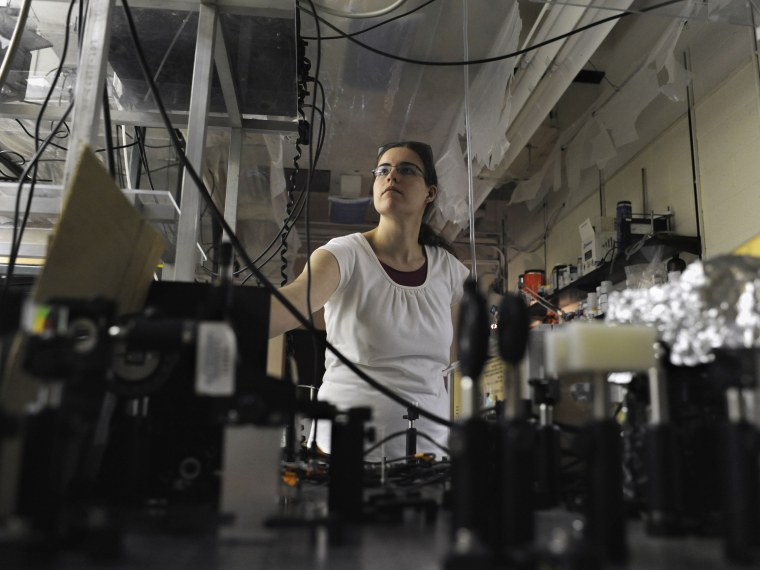If there were literally any Republican members of Congress who were glad to see the EPA's new limits on carbon pollution, they hid very well yesterday. Though support for the Clean Air Act and related environmental safeguards used to be bipartisan, GOP opposition to the White House's climate agenda was universal yesterday -- at least among Republican lawmakers,
if not Republican voters.
But the conservative
Washington Examiner published an item yesterday suggesting the party deserves at least some credit: "Even as Republican lawmakers denounced the Environmental Protection Agency's new rules on power plants, they avoided one argument: that climate change is not real." The piece added, "[N]o Republican leader on Capitol Hill -- and few if any party back-benchers -- challenged the existence of climate change when criticizing the proposed Environmental Protection Agency restrictions."
There are a couple of problems with this. The first is probably obvious: if Republicans are prepared to move away from climate denialism, they have a responsibility -- morally and politically -- to come up with some kind of proposed solutions to address the global warming crisis. Resisting the urge to "challenge the existence of climate change" is nice, but let's not set the bar for praise too low.
The second is that Republicans really haven't abandoned climate denialism. One need look no further than
the mind-numbing antics of the House Science Committee's GOP members.
Last Thursday the House Science, Space, and Technology Committee held a hearing to examine the UN Intergovernmental Panel on Climate Change Process. In his opening remarks, committee chairman Rep. Lamar Smith said the IPCC report and Obama administration's third National Climate Assessment are "designed to spread fear and alarm and provide cover for previously determined government policies."
The Republican chair of the House Science Committee added, "The president and others often claim that 97% of scientists believe that global warming is primarily driven by human activity. However, the study they cite has been debunked."
Smith added, "We should focus on good science, rather than politically correct science."
Oh my.
It's important to note that the 97% figure
comes from "a peer-reviewed study which found that 97.1 percent of scientific papers taking a position on anthropogenic climate change 'endorsed the consensus position that humans are causing global warming.'"
It has not been "debunked."
It's also worth remembering that House Republicans seem to go out of their way to identify the most anti-science members of their conference, and then reward them with a spot on the House Science Committee. Smith, clearly, is an odd choice to hold the chairman's gavel, but let's not forget that this same committee is home to Rep.
Paul Broun (R-Ga.), perhaps best known for arguing that cosmology, biology, and geology are, quite literally, "lies straight from the pit of Hell."
Rep.
Ralph Hall (R-Texas) not long ago said in reference to global warming, "I'm really more fearful of freezing. And I don't have any science to prove that." His party put him on the House Science Committee.
Rep.
Randy Neugebauer (R-Texas) once drafted a resolution for Americans to "join together in prayer to humbly seek fair weather conditions" after a series of destructive tornadoes and droughts. His party put him on the House Science Committee, too.
Rep.
Dana Rohrabacher (R-Calif.) once suggested "dinosaur flatulence" may have caused climate change 55 million years ago. His party put him on the House Science Committee, too.
With all of this in mind, Boer Deng published
a hilarious piece a couple of weeks ago, noting a bill Lamar Smith and other House Science Committee Republicans were pushing that "is universally hated by scientists" and would "harm the research process." Take a look at what happened:
An hour and a half into the session, two astonishing things happened. Rep. Donna Edwards, a Maryland Democrat on the committee, pointed out something obvious. The bill being marked up proposes changes to spending for FY2014. The money has already been appropriated, the scientific bodies the bill regulates are already spending it, and the fiscal year will be more than three-quarters of the way complete by the time a bill could reach the House floor for a vote. Should it pass, agencies would have to scramble to meet reconfigured budgets. FIRST proposes specific funding allocations to specific types of research. Some fields (such as social sciences, behavioral sciences, and geosciences) would be aggressively cut, and the National Science Foundation would need to reshuffle research funding late in the fiscal year in order to avoid exceeding these new numbers. How on Earth would that work? It was, in fact, "highly irresponsible" that the bill was even still being discussed. Smith stuttered so pitifully in struggling to answer her, you almost felt sorry for him. Yet in the face of that absurdity, the session just muddled forward. Smith moved on to the next amendment, as though the purpose of the hearing hadn't just been exposed as pointless.
If and when Republican leaders ever stop to consider the point at which science itself became a Democratic issue, I hope they'll keep moments like these in mind.
